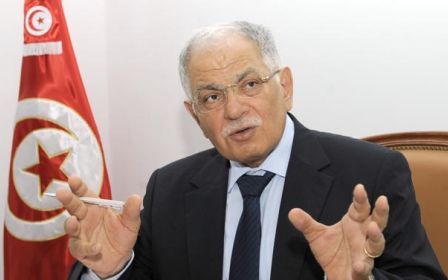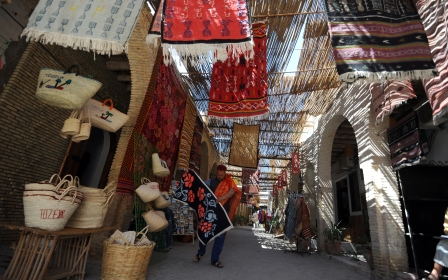Tunisian women push at the political glass ceiling

Tunisia, which is due to hold parliamentary elections next month and a presidential election in November, is known for its relatively progressive and liberal legislation after the 1956 personal status code gave women full and equal legal rights. Since then, a number of laws have been introduced that build on what many consider the most progressive pieces of women’s rights legislation in the Arab world. However, the reality on the ground is somewhat different.
“There is still a lot that needs to be done,” said the centre-left Ettakattol party politician, Lobna Jeribi. An elegant 41-year-old mother of two, Jeribi, a former university lecturer, holds a PhD in Information Systems from France and is the founder of her own company. The moment the revolution started, however, she said she stopped everything in order to give her all to her country’s democratic transition. It was a natural decision for her, she explained passionately in our short interview, before she ran to another engagement in downtown Tunis.
Jeribi is not alone - she represents a Tunisian political scene that has shifted since the revolution, with more females taking top-positions in government. Many women that were involved in the revolution joined political parties in order to contribute to the country’s democratic change; the majority of them young and first-time politicians. Political parties have also encouraged women to take on leadership roles. Ettakattol, for example, introduced a female wing and enforced internal quotas for their local, regional and national offices. This was “an attempt to ensure that women have a strong voice within the party”, said Jeribi.
Tunisia’s new constitution, passed on 26 January, built on the country’s already progressive women’s rights legislation. It is the first constitution in the region to guarantee all Tunisians - women and men - the right to run for president.
Also, an electoral law - Article 23 - stipulates that every governorate in Tunisia should run an equal number of male and female candidates for all elections.
Yet while this law was an important step forward for women who hoped to participate more in Tunisian politics, some female politicians feel the law could have gone much further to reflect their rise in the political sphere, guaranteeing “horizonal parity” - which would mean that half of all candidates on any list would be women.
The assembly vote in 2011 reflects the reality of the legislation: 50 percent all candidates who ran were women, but women gained only 23 percent of National Constituent Assembly (NCA) seats. When the NCA opened for business on 22 November, only 49 women out of 4,000 who competed for seats joined the discussion.
Female top candidates
“I am more than disappointed,” Jeribi said of the exclusion of horizontal parity. “I even handed in a protest to the constitutional court arguing that not including horizontal parity would be unconstitutional.”
In comparison, only 145 of the present 1,315 electoral lists, or about 10 percent, are headed by women. One of these top females is Ennahda party candidate Sayida Ounissi.
“I am not satisfied with the number of women in Tunisian politics,” Ounissi said. “We only have one female minister [minister of tourism Amel Karboul] and that is not enough.” Twenty-seven-year-old Ounissi started her PhD studies focusing on Tunisian social policies in 2011 and has been involved in Ennahda socially for as long as she can remember. Her parents, political opponents to former President Zine al-Abidine Ben Ali, were forced to flee to France as political refugees in 1993, but remained politically involved, she explained in an impeccable British accent, a result of her many involvements in international organisations, serving, for example, as President of the European coordination of ENAR, the European network against racism.
‘It's a man’s world’
Tunisian women gained the right to vote and stand for elections in 1959, and the first woman was elected to parliament in the same year. And although the female representation in Tunisia’s assembly is below 50 percent, it is still above the global average of 21.8 percent in lower houses of parliament, reports the international organisation the Inter-Parliamentary Union.
However, as elsewhere, women trying to enter the political sphere still face obstacles. “It's a man’s world,” stated Ounissi.
“Of course it is much harder for a woman, they need to make 10 times the effort,” said Jeribi.
The most evident obstacles include time restrictions as well as social and cultural expectations. “I think we need a political discourse that encourages women to enter politics,” said Ounissi, pointing to the importance of role models. “There is a generation of women right now that has worked a lot to be taken seriously.”
Jeribi is one of these women, her enthusiasm is contagious and her energy limitless. But, she said, we shouldn’t be fooled: it hasn’t always been easy. One practical obstacle she faced during recent years at the assembly was that many meetings took place during the evenings, making it tough for a woman with children. “I think the fact that I was already a very active woman had prepared me a lot,” she said. “But we really shouldn’t only focus on the quantity, quality is equally important, for example to train and prepare women.”
Only five women are in the top of Ettakattol’s lists. According to Jeribi, it is the party’s fault there are so few because there just wasn’t enough time for preparation. “There will be hard work to prepare women because even if the party wants to have more women on the head of lists, it is difficult because the lists need to be accepted by the whole region.”
Despite political parties’ efforts to try to strengthen the female voice and progressive legislation, a shift is still required in the mindset of many people. “There are not enough women in politics here,” said 26-year-old Eman. But she herself is not interested in becoming involved. “Me? No - too much fighting,” she said.
So is politics not for women? Of course it is, said Ounissi, but she would like to see a more responsible media. Ounissi has met women who are reluctant to enter politics because it would draw the media spotlight to their family issues. “For women in the Arab world, where reputation and family is very important, it can be specifically difficult,” she said.
The way forward
“Tunisia’s political parties should commit to the constitutional requirements for the protection and promotion of women's rights,” said Rothna Begum, who researches women’s rights in the Middle East and North Africa for Human Rights Watch, emphasising that despite that Tunisia’s constitution is one of the models for the region and the country is one of few with a constitutional obligation to work towards gender parity, unless this commitment is made on all levels it will take a long time before becoming reality.
“Tunisia’s political parties should seek to build the capacity of female election candidates, who require enhanced support to address the barriers that they face, and develop capacity-building initiatives such as campaign management or leadership for female candidates,” Begum stressed.
Ounissi said that, with only three weeks before the assembly election, too much time is spent debating, for example, issues such as to veil or not, or miniskirts or not, rather than more substantial issues like maternity leave. “We need to take the next step and identify today’s challenges,” she said.
“Ennahda wants to raise the time for maternity leave and introduce paternity leave like in some Nordic countries; we have studied the Swedish model.”
Another issue is sexual harassment in public and work spaces, which nobody dares to speak about, she said. “These are the important issues I want to bring into the public space.”
However, according to Jeribi, it is important that women don’t only engage in “female issues” but contribute to all topics. She is, for example, currently involved in a committee focusing on financial matters in order to break stereotypical perceptions on female political participation. Jeribi is optimistic. “Since the revolution we have won our first battle, we’ve started to change a little bit the mentality [of voters]. We were not used to women within politics before the revolution, but now we need to make people understand that we can have a female president or prime minister.
“We are in the right direction, in only three years we’ve made a lot of progress. Changing people’s mentality will take time.”
Stay informed with MEE's newsletters
Sign up to get the latest alerts, insights and analysis, starting with Turkey Unpacked
Middle East Eye delivers independent and unrivalled coverage and analysis of the Middle East, North Africa and beyond. To learn more about republishing this content and the associated fees, please fill out this form. More about MEE can be found here.




